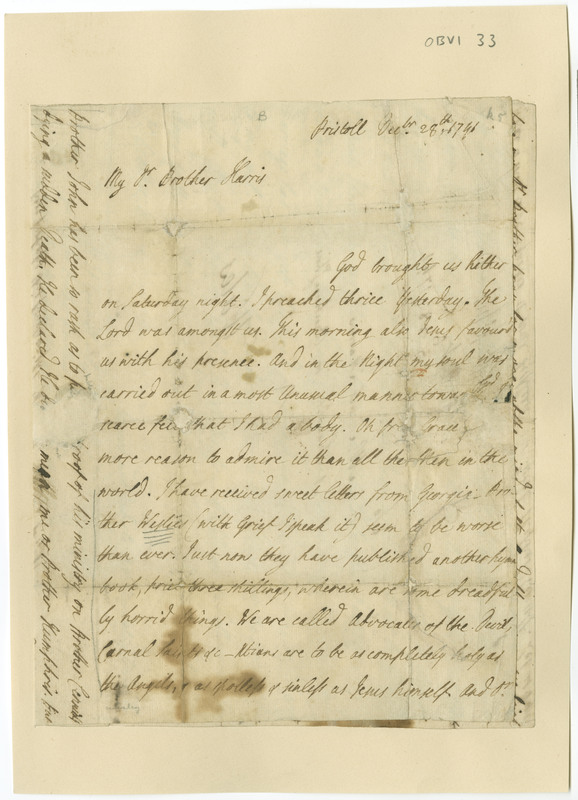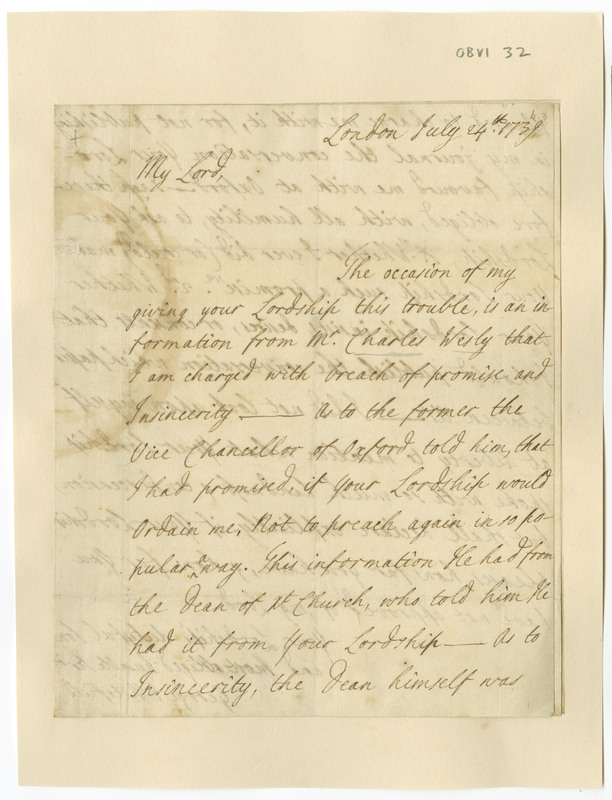Search
-
 Text
TextGeorge Whitefield letter to James Whitefield, April 12, 1759
Whitefield, George, 1714-1770A letter from George Whitefield to his nephew, James Whitefield, updating him on his father, mother, and sister. -
 Text
TextGeorge Whitefield letter to [James Whitefield?], ca. 1759
Whitefield, George, 1714-1770A letter from George Whitefield to his nephew, possibly James Whitefield, asking about his plans to remain in America and recommending some of Whitefield's connections who might be able to help get the nephew settled. -
 Text
TextGeorge Whitefield letter to Walter Peters, October 15, 1758
Whitefield, George, 1714-1770A letter from George Whitefield to Walter Peters in which Whitefield discusses his itinerant preaching near Leeds and plans for future travel. He also mentions an improvement in his health and asks for the continued prayers of his and Peters' friends in Scotland. -
 Text
TextGeorge Whitefield letter to Howell Harris, December 28, 1741
Whitefield, George, 1714-1770A letter from George Whitefied to Howell Harris discussing Whitefield's preaching and the recent publication of a book of hymns by the Wesleys. Whitefield also advises Harris to be gentle and kind in his ministering, reminding him that their responsibility is to be shepherds to the flock, not wolves to worry the sheep. -
 Text
TextGeorge Whitefield letter to Martin Benson, July 24, 1739
Whitefield, George, 1714-1770A letter from George Whitefield to Bishop Martin Benson in response to his implication of Whitefield preaching with "insincerity" and going back on promises made upon ordination. -
 Text
TextMarton Benson letter to George Whitefield, July 3, 1739
Benson, Martin, 1689-1752A letter from Bishop Martin Benson to George Whitefield reminding Whitefield of promises made concerning his conduct when Whitefield was ordained by the Bishop. -
 Text
TextDas Eltern die kinder zuo der Ehe nicht zwinge[n] noch hindern, : Vnd die kinder on der elltern willen sich nicht verloben solle[n]
Luther, Martin, 1483-1546Summary: Parental consent was an issue during the Reformation. Catholic orthodoxy demanded parental consent of the bridal couple as it impacted property. Luther saw value in both sides, arguing that while parents ought not to be able to compel children to marry or prevent weddings, the children ought to seek their parents' consent. -
 Text
TextWie in Eesachen vnnd den fellen so sich derhalben zutragen, nach Götlichem billichem rechten, Christenlich zu handeln sey
Brenz, Johannes, 1499-1570Summary: In this pamphlet, Johann Brenz, the Lutheran Reformer of South Germany, attacks papal marriage law, and limits the forbidden degrees (marriages) to the narrowest possible interpretation of the Biblical material. -
 Text
TextDas Elltern die Kinder zuo der Ee nicht zwinge[n] noch hindern : Vnd die Kinder on der Elltern willen sich nicht verloben sollen
Luther, Martin, 1483-1546Open letter to Hans Schott, Knight, by Luther on the subject of filial piety in marriage, i.e. to what extent the wishes of the parent must be taken into account in the choice of a life partner. Parental consent was an issue during the Reformation. Catholic orthodoxy demanded parental consent of the bridal couple as it impacted property. Luther saw value in both sides, arguing that while parents ought not to be able to compel children to marry or prevent weddings, the children ought to seek their parents' consent. -
 Text
TextDas Elltern die Kinder zur Ehe nicht zwingen noch hyndern : Vnd die kinder on der elltern willen sich nicht verloben sollen
Luther, Martin, 1483-1546Parental consent was an issue during the Reformation. Catholic orthodoxy demanded parental consent of the bridal couple as it impacted property. Luther saw value in both sides, arguing that while parents ought not to be able to compel children to marry or prevent weddings, the children ought to seek their parents' consent. -
 Text
TextDas Ellternn die Kinder zůr Ehe nicht zwinge[n] nach hindern vnd die Kinder on der Elltern willen sich nicht verloben sollenn
Luther, Martin, 1483-1546Summary: Parental consent was an issue during the Reformation. Catholic orthodoxy demanded parental consent of the bridal couple as it impacted property. Luther saw value in both sides, arguing that while parents ought not to be able to compel children to marry or prevent weddings, the children ought to seek their parents' consent. -
 Text
TextWie syben Weyber vber jhre vngeratene Menner klagen
Sachs, Hans, 1494-1576Satirical poem by the Nuremberg Meistersinger and cobbler about seven women complaining about their wayward husbands. The piece was originally published as a broadside in 1531 (cf. Erdmann) and is the counterpart to another poem by Sachs about seven men complaining about their wives. -
 Text
TextEine Schrifft, wie die Pfarherrn an den Örtern, da man die Papisterey widerumb auffricht, die Euangelisch Lehr, welche sie Lutherisch nennen, verloben vnd verschweren müssen
Summary: An anonymous pamphlet, containing an oath German pastors had to swear to renounce the "Evangelical doctrine, which is called Lutheran" in order to be readmitted to the Roman Catholic Church. The copy of the oath is preceded by two satirical poems regarding the oath, the first one representing the opinion of a wise man, the second one the answer of an unwise man. On the titlepage are two verses from Matthew 10 against the taking of oaths. The work is published by Christian Rödinger, a printer who put his press in service of the Reformation. -
 Text
TextHie vahet an das Register über die bibeln des alten testaments
Summary: There were 18 printings of the whole Bible in German before Luther's September Testament of 1522. These were all translated from the Latin vulgate. They are today chiefly remembered as giving the lie to the often expressed assertion that the Catholic Church discouraged the circulation of the Bible in the vernacular. Many church authorities were not pleased to admit that it was necessary to circulate it in German. But they realized that a certain lack of education coupled with the people's desire to know their religious heritage made it necessary to print in German. -
 Text
TextAd Leonem X. Pontificem Maximvm : Resolutiones disputationum de uirtute indulgentiarum reuere[n]di patris ... Martini Lutheri ...
Summary: This is the first collection of the Latin works of Luther to appear in print. Works by other authors (Mazzolini, Eck, and Karlstadt) are also included for historical perspective (and current reference). In part, this work is a kind of "position paper" to help clarify the issues of the upcoming Leipzig Disputation. This volume is quite rare. The first collection of the writings of Martin Luther; the original edition published by Johann Froben at Basel in 1518. -
 Text
TextVon den Empfahern, zeychen, vnd zusag des heyligenn Sacraments fleysch vnd bluts Christi
Karlstadt, Andreas Rudolff-Bodenstein von, 1486-1541Summary: Karlstadt wrote numerous tracts on the reception of the sacrament in both kinds. This tract deals especially with those who receive the sacrament, what the signs of the sacrament signify, and what promises are given to those who partake. -
 Text
TextDoctoris Martini Luthers kurtz schlussrede von den gelöbten vnd geistlichen leben der klöster
Luther, Martin, 1483-1546Summary: Luther's "Theses on Monasticisms" came about as a partial response to Melanchthon's essay in Loci Communes. Melanchthon revised this section of the Loci to take Luther's criticism into account. Luther's work was translated into German by at least three translators none of whom can be named with certainty. -
 Text
TextAin Sermon
Luther, Martin, 1483-1546Summary: Sermon preached August 10, 1522, on Matthew 7:15-23 (Beware of False Prophets). -
 Text
TextVon beyder gestalt des Sacraments zü nem[m]en : vnd ander nüwerung
Luther, Martin, 1483-1546When Luther returned from Wartburg Castle, he preached a series of Eight Sermons in an attempt to restore order in Wittenberg. This tract epitomizes the contents of these sermons. -
 Text
TextDer Zehen Gebot ein nützliche Erklärung
Luther, Martin, 1483-1546This is a 1523 printing of Martin Luther's popular sermon on the Ten Commandments and the Seven Deadly Sins, first printed in 1520 and reprinted numerous times. The work was originally composed in Latin and was translated into German by the cartographer and Christian Hebraist Sebastian Münster. -
 Text
TextEric Milner-White, 1884-1963 : fellow chaplain and dean, Dean of York ; a memoir prepared by direction of the Council of King's College, Cambridge
Wilkinson, L. P.Summary: A biography of Eric Milner-White.